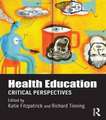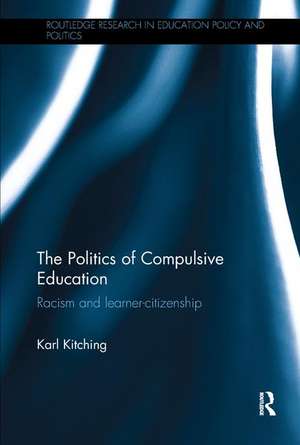The Politics of Compulsive Education: Racism and learner-citizenship: Routledge Research in Education Policy and Politics
Autor Karl Kitchingen Limba Engleză Paperback – 30 noi 2016
Using a variety of qualitative studies and analytic approaches, The Politics of Compulsive Education details the significance of mass education(s) to the ongoing racialisation of national sovereignty. It draws on in-depth historical, policy, media and school-based research, moving from the 19th century to the present day. Chapters explore diverse themes such as student deportation, austerity and the politics of community ‘integration’, the depoliticisation of third level education via international student and ‘quality’ teacher regimes, the racialised distribution of learner ‘ability’, and school-based bullying and harassment. Combined, these studies demonstrate the possibilities and constraints that exist for educational anti-racisms both in terms of social movements and everyday classroom situations.
The Politics of Compulsive Education asks key questions about anti-racist responsibility across multiple education sites and explores how racisms are both shaped, and can be interrupted, by the interaction of the global and the local, as seen in terms of migration, the distribution of capital, media, education policy discourse, and teacher and learner identifications. It will be of interest to researchers, academics and postgraduate students of sociology, education, cultural studies, political theory, philosophy and postcolonial studies.
| Toate formatele și edițiile | Preț | Express |
|---|---|---|
| Paperback (1) | 422.59 lei 6-8 săpt. | |
| Taylor & Francis – 30 noi 2016 | 422.59 lei 6-8 săpt. | |
| Hardback (1) | 1162.08 lei 6-8 săpt. | |
| Taylor & Francis – 24 noi 2014 | 1162.08 lei 6-8 săpt. |
Din seria Routledge Research in Education Policy and Politics
-
 Preț: 319.01 lei
Preț: 319.01 lei -
 Preț: 302.35 lei
Preț: 302.35 lei -
 Preț: 311.41 lei
Preț: 311.41 lei - 18%
 Preț: 1108.70 lei
Preț: 1108.70 lei -
 Preț: 462.43 lei
Preț: 462.43 lei - 18%
 Preț: 1163.19 lei
Preț: 1163.19 lei -
 Preț: 370.77 lei
Preț: 370.77 lei -
 Preț: 455.78 lei
Preț: 455.78 lei -
 Preț: 402.66 lei
Preț: 402.66 lei -
 Preț: 389.38 lei
Preț: 389.38 lei - 17%
 Preț: 256.48 lei
Preț: 256.48 lei -
 Preț: 402.66 lei
Preț: 402.66 lei -
 Preț: 387.49 lei
Preț: 387.49 lei -
 Preț: 448.50 lei
Preț: 448.50 lei -
 Preț: 302.75 lei
Preț: 302.75 lei - 18%
 Preț: 1055.51 lei
Preț: 1055.51 lei - 18%
 Preț: 890.74 lei
Preț: 890.74 lei -
 Preț: 454.82 lei
Preț: 454.82 lei -
 Preț: 284.52 lei
Preț: 284.52 lei - 18%
 Preț: 727.19 lei
Preț: 727.19 lei -
 Preț: 376.10 lei
Preț: 376.10 lei -
 Preț: 392.11 lei
Preț: 392.11 lei - 18%
 Preț: 1218.08 lei
Preț: 1218.08 lei - 26%
 Preț: 764.22 lei
Preț: 764.22 lei - 28%
 Preț: 846.53 lei
Preț: 846.53 lei - 18%
 Preț: 1000.27 lei
Preț: 1000.27 lei - 18%
 Preț: 699.21 lei
Preț: 699.21 lei -
 Preț: 422.59 lei
Preț: 422.59 lei - 18%
 Preț: 1000.13 lei
Preț: 1000.13 lei - 26%
 Preț: 819.48 lei
Preț: 819.48 lei - 16%
 Preț: 254.82 lei
Preț: 254.82 lei - 24%
 Preț: 573.64 lei
Preț: 573.64 lei - 18%
 Preț: 1000.27 lei
Preț: 1000.27 lei - 28%
 Preț: 819.09 lei
Preț: 819.09 lei - 18%
 Preț: 1161.28 lei
Preț: 1161.28 lei
Preț: 422.59 lei
Nou
Puncte Express: 634
Preț estimativ în valută:
80.86€ • 84.43$ • 66.92£
80.86€ • 84.43$ • 66.92£
Carte tipărită la comandă
Livrare economică 05-19 aprilie
Preluare comenzi: 021 569.72.76
Specificații
ISBN-13: 9781138284784
ISBN-10: 1138284785
Pagini: 202
Dimensiuni: 156 x 234 x 11 mm
Greutate: 0.45 kg
Ediția:1
Editura: Taylor & Francis
Colecția Routledge
Seria Routledge Research in Education Policy and Politics
Locul publicării:Oxford, United Kingdom
ISBN-10: 1138284785
Pagini: 202
Dimensiuni: 156 x 234 x 11 mm
Greutate: 0.45 kg
Ediția:1
Editura: Taylor & Francis
Colecția Routledge
Seria Routledge Research in Education Policy and Politics
Locul publicării:Oxford, United Kingdom
Public țintă
Postgraduate and ProfessionalCuprins
1. Compulsive education: The troubling uses of race, migration and learner-citizenship
2. Ambivalent Atlantic encounters: Assembling ‘the Irish’ as an educable race in the 19th century
3. Purity and diversity as love for the nation: Being heard and contained in educational ‘evolution’
4. Mediated blood transfusions and inoculations: desirable/bogus immigrants, and the warmth of Irish educational community
5. ‘Where is she from if she’s not making her Communion?’ Unpacking ‘community’, integration and segregation in contemporary primary schooling
6. How teachers’ bodies are mobilised to feel about diversity: PISA shock, policy motivation and finite inclusion
7. Everyday attributions of ability and value: Blurring designations of good/bad, immigrant/working class Others
8. The ‘ebb and flow’ of racist micro-aggressions: un/doing everyday uses of and relations between learner bodies
9. Anti-racisms, acts of learner-citizenship and answerability
2. Ambivalent Atlantic encounters: Assembling ‘the Irish’ as an educable race in the 19th century
3. Purity and diversity as love for the nation: Being heard and contained in educational ‘evolution’
4. Mediated blood transfusions and inoculations: desirable/bogus immigrants, and the warmth of Irish educational community
5. ‘Where is she from if she’s not making her Communion?’ Unpacking ‘community’, integration and segregation in contemporary primary schooling
6. How teachers’ bodies are mobilised to feel about diversity: PISA shock, policy motivation and finite inclusion
7. Everyday attributions of ability and value: Blurring designations of good/bad, immigrant/working class Others
8. The ‘ebb and flow’ of racist micro-aggressions: un/doing everyday uses of and relations between learner bodies
9. Anti-racisms, acts of learner-citizenship and answerability
Notă biografică
Karl Kitching is a lecturer in the School of Education, University College Cork. He is currently completing an Irish Research Council-funded study titled ‘Making Communion: Disappearing and Emerging Forms of Childhood in Ireland’ with Dr Yafa Shanneik. Karl is a member of Anti-Deportation Cork, which is a multi-ethnic, grassroots collective that seeks to end the dispersal, detention and deportation of asylum seekers.
Descriere
Using a variety of qualitative studies and analytic approaches, The Politics of Compulsive Education details the significance of mass education(s) to the ongoing racialisation of national sovereignty. It draws on in-depth historical, policy, media and school-based research, moving from the 19th century to the present day. Chapters explore diverse themes such as student deportation, austerity and the politics of community ‘integration’, the depoliticisation of third level education via international student and ‘quality’ teacher regimes, the racialised distribution of learner ‘ability’, and school-based bullying and harassment. Combined, these studies demonstrate the possibilities and constraints that exist for educational anti-racisms both in terms of social movements and everyday classroom situations.
